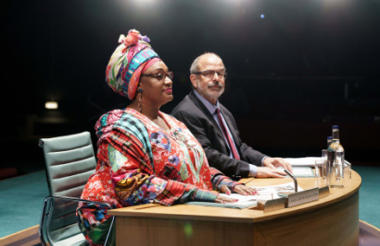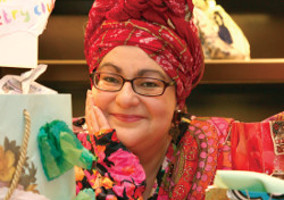After a night out to see the Kids Company musical Kirsty Weakley reflects on what charities could learn.
Many of us remember vividly the slow motion car crash that was the Public Administration and Constitutional Affairs Committee’s oral evidence session with Camila Batmanghelidjh, chief executive of Kids Company. Now it has been brought to life again in musical form at the Donmar Theatre.
Committee, the script for which has been taken almost entirely from the transcript of the evidence session, is actually shorter than the original event – although most of the key one-liners that avid followers of charity select committee sessions will remember (“why do you call it a failing charity? Because it went bust”, “This is a spiel of psychobabble, a torrent of words, verbal ectoplasm” and “stop talking”) all made the cut.
On the whole the musical was fun, if a little niche – I’m not sure how much crossover there is between musical theatre lovers and obsessed followers of the downfall of Kids Company, though the theatre did seem fairly full.
In truth it was difficult to embellish on the spectacle that was the original evidence session, which you can always watch again online here. But the performers made a decent job of bringing movement to what was in reality a pretty static affair, though I did feel the actor playing Paul Flynn hadn’t quite embodied Flynn’s deep-seated loathing of all things connected to Kids Company.
This is not really a review, though. If you found the original evidence session interesting, you'll find the performance interesting. But it did serve as a useful reminder of what was actually discussed.
Still waiting for answers
The performance highlighted that the charity’s chair and chief executive were unable to answer basic questions about how the charity was run, who it helped and who was in charge. There was no exaggeration; none was needed.
Despite the frequent repetition from the chorus of MPs that they “want to learn” and the “objective is not to conduct a show trial”, it reminded me that in the immediate aftermath of the collapse of the charity there was a rush to find the right person to blame.
The strength of feeling that comes across from the Pacac MPs tells us much more about how very angry they are about the situation, than how to prevent it.
In real life Pacac followed up its ‘show trial’ by producing a pretty damning report with sweeping recommendations for government, the Charity Commission and charities themselves.
But since then very little feels like it has changed.
The government committed to reforming the process of giving grants to charities. New standards were published last year and government has set up a new group to oversee and advise on high-risk grants.
But it hasn’t got round to publishing, what was admittedly a cumbersome, inconsistent and confusing, public government grants register, as it did for 2014/15 and 2013/14.
It also remains to be seen whether government departments have learnt any lessons when it comes to awarding funding. Last year when the recipients of the Tampon Tax fund were announced there was concerns raised around one of the charities set to receive money.
For its part the charity sector has been vocal in recognising that governance needs to be improved and there a number of initiatives and programmes under way looking at how to do this. The new Charity Governance Code launched a few weeks ago – how well used this is by the wider community will be a key test of whether the sector really has learnt its lesson.
So things have happened, but any change is likely to be incremental, rather than the definitive and clear-cut changes that make for a simple narrative.
We’re also still waiting on the Charity Commission to publish the findings of its inquiry into the charity, which are likely to answer some of the questions that Yentob and Batmanghelidjh were unable to in 2015.
Batmanghelidjh is also working on a book, promising her side of the story, although that has already been delayed my almost a year.
Why has Kids Company captured the public’s imagination?
Kids Company was not the first large charity to collapse, and it will not be the last. So just why is there so much attention on its demise?
Just yesterday we had an update on Lifeline Project, which ran out of money after expanding too quickly and taking on loss-making contracts, but I very much doubt anyone plans to set that to music.
The combination of high-profile backers, a compelling cause and flamboyant personalities made the collapse of Kids Company one of the biggest stories of summer 2015. And the same reasons mean the story endures, both in the theatre, and in people’s memories.
So even though Kids Company was not representative of the whole sector it will continue to be how charity governance is measured and the stick with which the sector is beaten with every time something looks as though it is going wrong.
Related articles













